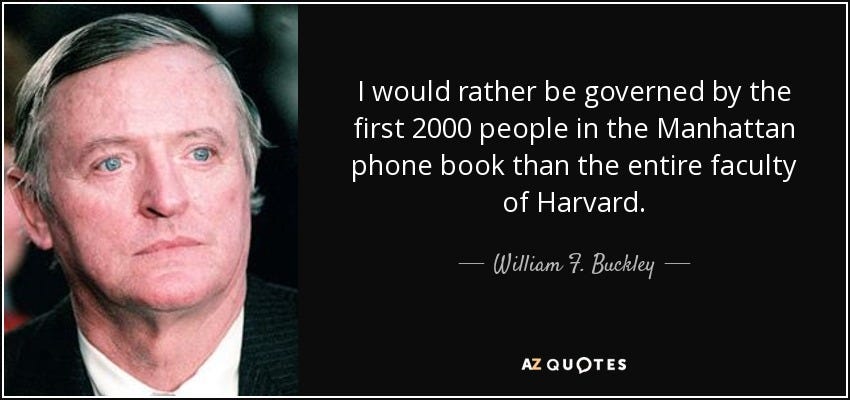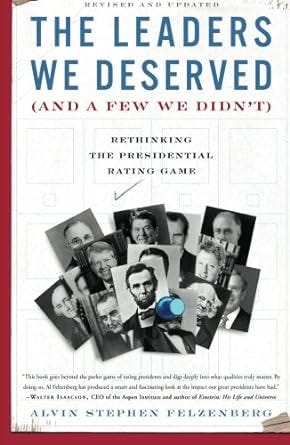How to Genuinely Rate Presidents
A survey of "self-styled experts" dominated the media over Presidents Day weekend, but there's a much better way, thanks to Dr. Al Felzenberg
If COVID-19, national intelligence failures, incompetence, and corruption of the past several years have taught us anything, we shouldn’t put too much trust in self-styled experts. We’ve been lied to or exposed to much malevolence, from phony dossiers to coverups, bad advice, and worse.
COVID was bad enough when the discredited Centers for Disease Control and National Institutes of Health fumbled, bumbled, and lied their way through the worst pandemic of a generation, from contradictory, if not bad, advice about masks and school closings to vaccines that neither protected against nor prevented the spread of disease. And don’t get me started on the source of the pandemic, to which they appear to have contributed (i.e., taxpayer dollars used to fund “gain of function” research at the Wuhan, China lab).
But if there are “expert” malcontents we should be especially wary of, it is a gaggle of self-proclaimed presidential “historians.” The weekend’s “2024 Presidential Greatness Project Expert Survey” survey is a case in point. Conducted during the last six weeks of 2023, the survey reflects the views of 525 “current and recent members of the Presidents & Executive Politics Section of the American Political Science Association, which is the foremost organization of social science experts in presidential politics, as well as scholars who had recently published peer-reviewed academic research in key related scholarly journals or academic presses.”
Sorry, I’m not impressed with any survey that ranks our corrupt, impaired, and enfeebled current occupant of three years, Joe Biden, as one of our nation’s top presidents, above Ronald Reagan, Ulysses S. Grant, and a notch below John Adams. I am immediately reminded of something the late William F. Buckley Jr. famously said in 1961.
To their credit, the survey's authors, Brandon Rottinghous of Houston University and Justin Vaughn of Coastal Carolina University, admit personal partisan biases among the survey’s participants but do nothing to control for it, or even try to avoid it. What value does a survey like that demonstrate other than confirming that most political scientists let their partisan biases guide their work and are disconnected from reality?
Examining our respondents' partisan and ideological differences also indicates some interesting dynamics. While partisanship and ideology don’t tend to make a major difference overall, there are a few distinctions worth noting. For example, Republicans and Conservatives rank George Washington as the greatest president and James Buchanan as the least great. There are also several presidents where partisan polarization is evident – Reagan, George H.W. Bush, Obama, and Biden – but interestingly not for Bill Clinton.
There were also no criteria against which presidents were rated. It was purely subjective, including their list of “most underrated” presidents (Carter) and “most overrated” (Kennedy and Reagan). They blame Trump for being the most “polarizing” president (why add that?) when, back in the day, that award would have gone to Lincoln (just as the southern states that refused to include him on their presidential ballots in 1860). The more I think about this survey, the angrier I am at journalists like the New York Times’s Peter Baker, one of the more experienced, normal, and respected reporters left in their otherwise woke and deluded newsroom, for giving it coverage. He should know better. It must’ve been a really slow news day.
And since this survey is published relatively often, rankings fecklessly shift, which they feebly acknowledge. Fondness for Obama’s demonstrably failed presidency is on the ascendency, while one of the most economically successful presidents of the 20th century, Calvin Coolidge, is on the descent. I give them credit only for consistently rating Abraham Lincoln as our nation’s top president, closely accompanied by the Roosevelts, Theodore and Franklin, and of course, the father of our country, George Washington.
A solid survey of “experts” would at least try to minimize, if not account for, partisan and ideological bias. It confirms that the survey fails (I could stop there) to serve as a reasonable barometer. Instead, it is a fickle attempt to get attention around a slow-news holiday created to honor those who have served as our nation’s chief executive. As with so much in our media these days, especially from self-styled “experts,” it insults our intelligence.
Fortunately, we have a better template from my friend and presidential historian, Dr. Alvin S. Felzenberg. Now retired, Dr. Felzenberg is a prolific author of several books who has worked not just in academia as a professor at places such as Princeton, Yale, and the University of Pennsylvania (where he has invited me to guest teach about the US Senate and lobbying), but also in the executive and legislative branches of our federal government. He’s also been a deputy Secretary of State for New Jersey. He served as communications director for the 9/11 Commission, led by former New Jersey Gov. Tom Kean Sr. and former US Rep. Lee Hamilton (D-IN).
Felzenberg’s historical expertise also extends to the legendary Buckley, the topic of his final book, “A Man and His Presidents, The Political Odyssey of William F. Buckley.”
I first encountered Dr. Felzenberg shortly after the 1992 election when I was staff director of the Senate Republican Policy Committee (RPC). The experts we often relied on during the George H. W. Bush Administration soon vacated their political appointments following Bush’s defeat at the polls that Fall. I offered a few of them temporary residence as unpaid “fellows” for the RPC while they scouted for future employment. Dr. Felzenberg, a former Chief of the Staff for the National Endowment for the Arts, was one of them. He would later become a senior aide to Jim Saxton (R-NJ) and US Rep. Tom Davis (R-VA), two highly respected center-right Members of Congress.
I may be showing my biases, but as a long-time amateur historian, I firmly assert that Dr. Felzenberg has the weekend’s silly survey, and many of his colleagues beat as the preeminent expert on how to rate presidents and their presidencies. He authored “The Leaders We Deserved (and A Few We Didn’t)” as the George W. Bush Administration was winding down in 2008. Conceiving the book shortly after the 1996 election, Felzenberg’s extensive knowledge of our nation’s presidents and approachable, conversational style makes his book a fun and informative read, unlike most boring political science tomes. As the Foundation for Economic Education’s Burton Folsom pointed out in 2009, it's not perfect, but it’s the best we’ve encountered.
Instead of relying on Buckley’s proverbial Harvard faculty (and we’ve seen how they’re doing these days), he developed a more impartial (no rating is not without its subjectivity) and thoughtful rating system that much more impassionately analyzes presidencies on six factors: Character; Vision; Competence; Economic Policy; Preserving and Extending Liberty; and finally, Defense, National Security, and Foreign Policy. He extends a rating of one to five on each trait, giving each President an average score. With the benefit of time and reflection since the book was published, I’d be inclined to offer a seventh category - personnel. As Ronald Reagan famously noted, personnel is policy. As we’ve seen, both Trump and Biden have suffered from poor personnel choices, especially early on.
Like most of his fellow “experts” (he rises well above most of them), he rates Lincoln tops with a perfect score of 5. Washington followed with 4.67; Theodore Roosevelt and Ronald Reagan tied for third with scores of 4.5. Also, like his “colleagues,” he rates Andrew Johnson and Pennsylvania’s lone contribution to the presidency, James Buchanan, as among our worst (of course, our “self-styled experts” have given last place honors to Donald J. Trump, who is not included in Felzenberg’s 2008 book).
Felzenberg rates Dwight Eisenhower slightly higher than Franklin Roosevelt, with scores of 4.17 and 4, respectively. There are plenty of other surprises, especially how low he ranks Thomas Jefferson (tied for 14th with Woodrow Wilson), but he provides a strong, thought-provoking rationale for each.
I don’t know how Dr. Felzenberg would rate the five presidents since his book was published, including Bush 43, whom he declined to rate since his presidency wasn’t finished; I’ll have to ask. And while I wouldn’t rate Donald Trump in my top 10, Biden would fall deep into my bottom five below Richard M. Nixon and James E. Carter. Obama wouldn’t also rate much higher and below Bill Clinton (tied for 22nd by Felzenberg) given his failures by worsening race relations, contributions to the Russia Collusion hoax, foreign policy failures (the Iran deal, asking for “flexibility” from Putin), and severe damage done to our health care system with “Obamacare.” The politicization of the judiciary also launched on Obama’s watch under the tutelage of his execrable Attorney General, Eric “Fast and Furious” Holder.
For the reasons Felzenberg outlined in his book on why he didn’t yet rate George W. Bush (or two other presidents who died shortly into their terms), I would be disinclined to rate Biden until he departs office. But given his massive set of abysmal failures (e.g., Afghanistan) and obvious incompetency, it’s not hard to figure out where he’d wind up, especially if investigations into Biden Crime Family antics continue apace, elections permitting. The latest expose from left-leaning Politico, of all sources, is but the latest.
Biden might give James Buchanan a run for his money and replace Pennsylvania with Delaware as the home of our nation’s worst president. He’s certainly working on it. Buchanan, at least, wasn’t accused of selling official access to our nation’s enemies for cash.
History and new information alter how we view and judge presidencies. After three years of disastrous Biden maladministration, the Trump presidency looks pretty good, despite his chaotic and cringeworthy comportment and the bad advice he followed from Covid’s outset. His courting and kind words for members of the Axis of Evil don’t help. There’s no telling the stories we’ll likely hear after Biden shuffles his way out of the White House for the final time.
If you want to get a real feel for our nation’s presidents and their successes and failures, at least through most of the George W. Bush administration, it’s not too late to pick up a copy of Al Felzenberg’s seminal work. You can and should ignore the political science professors and their survey from the weekend.







Do you mean to say there is not category for a nice old man with a bad memory? I think Dr. Alvin S. Felzenberg, who I also know well and respect, has a much more cogent system of ranking Presidents. The American Political Science Association is so partisanly lopsided that their rankings should not be treated as credible.
Well, for all we can admire FDR did, his mixed record certainly keeps off the "best" list. His main virtue was that he inspired the nation to pull itself out of the doldrums, no mean accomplishment, and then reboot quickly to win a world war. Now, that's nothing to sneeze at: it's the hallmark of true leadership, and that alone puts him in a special category of reverence. But was the New Deal all that good for the country? And was he blinded by Uncle Joe into ceding half of Europe to communist imperialism? Truman had that figured out; his boss didn't. Mixed record, as I said.
The other Roosevelt comes out better, but still, he helped start the US on the path to destructive Progressivism. A blot on his record, just as Trump's bowing to pressure from the Medical Mafia on the coronavirus, really the main legitimate complaint against his administration; the rest was pretty awesome!
I would rank Clinton behind Carter; the latter was merely inept; the former deeply corrupt, far worse than Nixon. I believe the rot in our system today, and especially in the Democratic Party, dates to Clinton's unprecedented corruption.